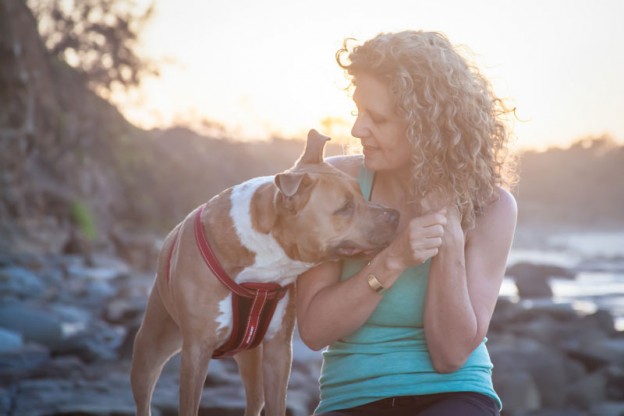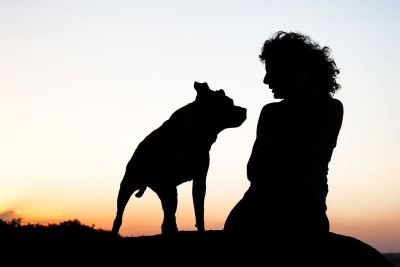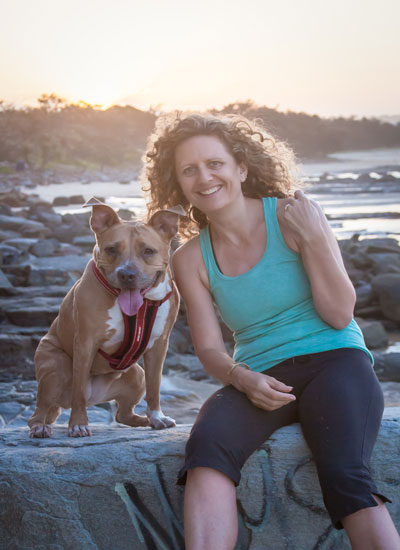
It’s every responsible dog owner’s worst nightmare. Laura Greaves investigates what you should do if the unthinkable happens.
Pumpkin the American Staffordshire Terrier was nothing if not well behaved. The friendly five-year-old had graduated from puppy school, completed advanced-level obedience training and was an enthusiastic agility competitor.
“The Pump”, as she was affectionately known, was a popular fixture at the off-leash dog beach near the Sunshine Coast home of her owner, photographer Helga Dalla. “We walked religiously every day, sometimes twice a day, and she would have a romp and play with the other dogs on the beach,” she says.
But then one day, the unthinkable happened. Without warning, Pumpkin attacked a Poodle, a dog she had encountered many times before, biting it and injuring its elderly owner in the ensuing chaos.
“The lady tripped and fell, grabbing her dog and holding it tightly to her chest. Pumpkin jumped on top of the Poodle, which was on top of the lady, until I pulled her off and tied her to a nearby tree,” Dalla recalls. “The Poodle had a tooth-puncture wound on the side of the neck. The lady was bleeding on the hand and leg, scratched as her dog tried to escape.”
Thankfully, neither the Poodle nor its owner was seriously hurt, but Dalla says the incident left her feeling very shaken.
“I still see the lady and her Poodle when I’m out walking, and it’s nice that we’ve remained friendly after such a horrific experience. It took both of us a while to get the courage to venture out with our dogs after the incident.”
 Why do dogs bite?
Why do dogs bite?
Every responsible dog owner is sure it will never happen to them, but the truth is that, given the right set of circumstances, any dog may bite. In a 2001 Canadian study, around 15 per cent of dogs were found to have bitten someone at some stage.
A dog that bites does so for a reason, whether we can identify it or not — and it doesn’t mean those dogs are “bad”, “crazy” or irrevocably aggressive.
“Those adjectives we use for dogs that display aggressive behaviour are really not valid. Dogs don’t do anything for no reason,” says Dogs Life’s own Kersti Seksel, a registered veterinary specialist in Animal Behaviour. “Can we always explain it? Potentially not, but they don’t just wake up and think, ‘I’ll go and bite someone today’,”
According to Dr Seksel, the most common reason why dogs bite is an underlying anxiety disorder. Around 20 per cent of humans suffer from anxiety and recent research reveals a similar proportion of dogs are afflicted.
“Anxiety is a medical condition. The brain is wired differently and the neurochemical activity in the brain is different (to a normal dog). The dog is anxious because it can’t predict the outcomes of events,” she explains. “With anxiety, there’s a genetic predisposition and then environment and learned behaviour can trigger the dog to bite someone in certain situations.”
What next?
In the immediate aftermath of a dog bite, the most important thing to do is seek urgent veterinary or medical attention for injured dogs or people. If your dog is uninjured, secure it in a safe place while you tend to yourself and others.
When you’re sure everyone is okay, make an appointment for your dog to see your vet. A thorough physical examination and blood tests are essential to ensure there’s no physical reason for the behaviour.
“Sometimes dogs that bite are in physical pain, not mental pain. If the dog has a sore ear, for example, and a child pats or pulls that ear, the dog may well react. Pain is a very big predictor of behaviour,” says Dr Seksel.
If nothing physical is found, ask your vet for a referral to an accredited veterinary behaviour specialist for further investigation of your dog’s behaviour. If your dog is subsequently diagnosed with an anxiety disorder, treatment options include anti-anxiety medication and behavioural and environmental modification.
Crucially, do not punish your dog or banish it from day-to-day family life. “Society expects you to reprimand the dog, but if your dog has an anxiety disorder and is feeling stressed and anxious, yelling at or smacking him will only increase that,” Dr Seksel says. “The dog doesn’t know that you think biting is bad. If you ostracise the dog and exclude it from family activities, it can’t actually learn to behave the way you want it to.”
The legalities
Australia does not currently have mandatory reporting laws for dog attacks, which means you are not legally obliged to tell anyone if your dog bites a person or animal, but you may do so if you wish.
 Give yourself a break
Give yourself a break
If you’re a dog lover and a responsible owner, then it’s no exaggeration to say your dog biting a person or another animal is one of the worst things that could happen to you. It is an enormously stressful experience and it’s natural to feel worried and guilty — but it’s also really important to cut yourself some slack.
Dalla says she still feels “embarrassed” about what happened with Pumpkin, who sadly passed away in December after a battle with cancer, but knows she was not to blame. “The fact is that, regardless of the amount of training, dogs can ‘turn’, which is what happened in Pumpkin’s case,” she says.
A dog that bites is not necessarily a reflection of a “bad” or irresponsible owner, and beating yourself up isn’t going to help you or your four-legged friend. “So often people come to see me and their guilt is really overwhelming. It’s very hard for them to move forward until you say, ‘This is not your fault’,” says Dr Seksel. “If you realise the (truth of the) situation, then you’ll realise the dog was stressed and worried. Recognising the anxiety is a very important first step.”





I can imagine how Dalla felt with Pumpkin. My beautiful border collie has been attacked 5x times by staffies at our local beach and then he became a biter. Biting would happen suddenly and only to other dogs. We have hired 3x different trainers, I’ve read books, you tube anything I can to retrain my boy to becoming secure around other dogs and elliviate his fear that another dog will attack me. We have been forced to walk the streets and off leash at the beach is only an option early in the mornings when only dogs he knows are there. I am always on my guard, which doesn’t help the situation yet what else can I do?